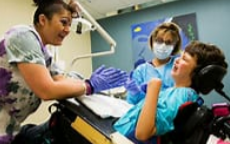December 3 is recognized as the IDPD, but let’s emphasize excellent dental care for these folks for the entire month of December. Disabled people include:

- Aging and elderly people
- Individuals with mobility issues
- Mentally disabled individuals
- Physically impaired folks
- People with behavioral or emotional conditions
- Those cognitively impaired
Dental care for Persons with Disabilities starts in infancy. The care giver is instrumental in preventing dental problems. A visit to the dentist should take place as soon as the first tooth appears, between 6 and 12 months old. This is the time for caregivers to ask questions. The dental team will help with dietary tips and will teach the caregiver how to care for the teeth at home. Starting these practices early and consistently will prevent severe dental disease.
Excellent dental health enhances the quality of life and improves the overall health of all people in so many ways:
- Healthy food intake
- Speech development
- Emotional expression
- Comfort and psychological ease
- Patient acceptance of oral touching and manipulation
Here are some tips to improve daily home care are:
- Use a power toothbrush with a small head if possible. Or a manual toothbrush with a large or modified handle and a floss holder can make brushing and flossing easier.
- If possible, use fluoride toothpaste and mouth rinse to prevent tooth decay and strengthen the enamel. For patients who cannot tolerate toothpaste, try diluting an acceptable mouth rinse and dip the toothbrush in that. Sometimes plain water is okay to use.
- Avoid sugary foods that can damage the teeth.
- These patients should be offered only water or milk to drink. Drink plenty of water to keep the mouth moist and wash away food particles.
- Fun routines are beneficial. A few ideas include singing or counting during brushing; allowing a choice of the flavor of the toothpaste to be used. Always compliment when done with a hearty “Good job!”
- Here are positions which often are easier for cleaning another’s teeth: “hygiene in a Highchair,” “knee-to-knee” and laying a “swaddled baby: onto a soft rug with the caregiver behind the head.
- Clean the teeth in the same manner and at the same time and place every day.
- Model excellent oral hygiene yourself.
If the patient is able to understand, do prepare the person for an upcoming dental visit. There are fun books to read about the dental office. Talk repeatedly about how nice the dental team is and explain that you yourself enjoy and like the dental team. Visit the office first, to make sure there is easy access into and out of the office. Ask the dental team if the disabled person can visit the reception area a few times. Just sit there and read or color with the child, to familiarize the person with the dental office. Ask the dental team to talk to the patient without a mask and white coats and goggles for a few minutes. Ask the dental team if the patient can visit “the back” and listen to the sounds of the office.
Schedule disabled patients for the first appointment of the day if possible. Early appointments can help ensure that everyone is alert and attentive and that waiting time is reduced. At the actual dental appointment, make sure that comfortable and loose clothing is worn. If there is a comforting blanket or toy, be sure to bring that along.
Before the actual appointment, repeatedly tell the patient what will be happening, step by step. There are many books available about visiting the dentist. Before any appointment, determine how the patient will be transferred from wheelchair to dental chair. It is recommended that familiar adults do so.
Providing dental care to individuals with disabilities does require increased awareness, attention and accommodation by the dentist and dental staff. Here are some of the things that the dental team might do:
- Emphasizing preventative measures such as fluoride varnishes, more frequent dental cleanings, and sealants.
- Consultation with other health care providers. An example of accommodation would be sugar-free medicines.
- The caregiver might be asked how to communicate with patients who have a sensory impairment.
- Patient accommodations.
- Behavior management techniques used at home can often be transferred to the dental office.
- Modifications to routine treatment procedures
- Placing pillows from home on both sides of the patient can provide stability.
- Shorter appointment times may be recommended. These require extra trips to the dental office.
Most general dentists will provide excellent care in their offices for all ages and abilities. Speak to your own dentist first. Sometimes there will be a referral to specialists. These include:
- Pedodontists for children
- Hospital dentists
- The University of Michigan School Of Dentistry Integrated Special Care Clinic
We want disabled people to have the highest quality of life and overall health as possible. Therefore, let’s control those areas of our lives we can to enhance these goals. Excellent dental health is a good place to start.
Dr. Jessica A. Rickert is a tribal citizen of the Prairie Band Potawatomi Nation. A graduate of the University of Michigan School of Dentistry, in 1975, she became the first female Native American dentist.
More Stories Like This
This National Cancer Prevention Month, Reduce Your RiskNew Mexico Will Investigate Forced Sterilization of Native American Women
USDA Expands Aid for Lost Farming Revenue Due to 2025 Policies
Two Feathers Native American Family Services Wins 2026 Irvine Leadership Award
Bill Would Give Federal Marshals Authority to Help Tribes Find Missing Children
